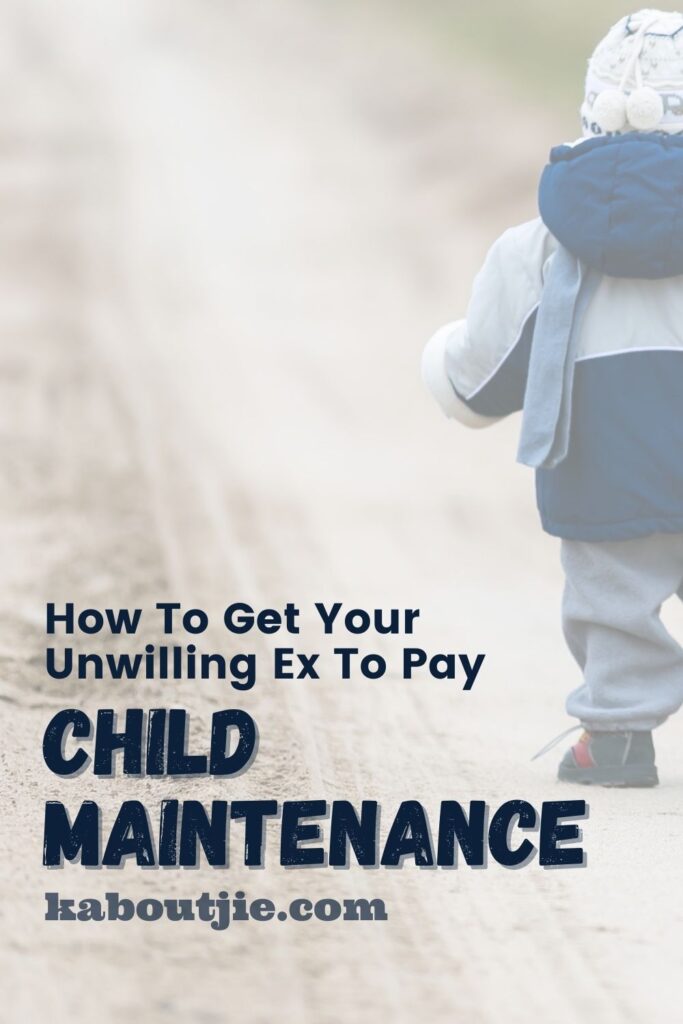When divorce splits up a family it is a terribly hard time for everyone even if the process goes as smoothly as it possibly can. Figuring out how custody and maintenance of your children is going to work is an important part of a divorce proceeding. Very often one party may be unwilling or unable to pay child maintenance and then things can get very sticky. It was fantastic having Mariska Botha join me live to talk about the ins and outs of maintenance and how to go about getting maintenance from your ex.

About Mariska Botha

Mariska is 29 and she lives in Durbanville. She is single with no children, but she has a very big passion for children. She has an LLB through UNISA and is currently doing a course on family law mediation. When she is finished she will be a registered family law mediator.
She has done two years of articles, of training in law and she has also been working in post admission for three years. She has high court appearance in the Western Capel. She is currently working for Koorts Attorneys and she specializes in family law, personal injury and debt collections. Overall, all civil types of work, she does not like criminal law that much.
If you need some legal assistance you can contact Mariska on 074 675 4755 or or mariska@koortsattorneys.co.za.
What Is Maintenance and Who Has The Responsibility To Pay It?
There are a few different types of maintenance with child maintenance and spousal maintenance being the main types. These types of maintenance arise from divorce and/ or having a child with someone. There is also parental maintenance which is when elderly parents cannot support themselves and their children need to look after them.
The person that has the responsibility to pay the maintenance would be spouses, ex spouses, children (in the case of elderly parents), parents or other family members. If someone cannot maintain themselves there are rules and laws that state that family members and people around them that have a duty to support them. Support can be claimed for from grandparents.
If the child is married (and the spouse is not maintaining said child) the grandparents and or parents have a claim of recourse against that spouse.
The courts want the person called upon to provide support to be able to provide such support.
Barlow v Barlow the duty to support is based on:
- relationship
- need to be supported
- adequate resources on parts of person who is called upon to provide support
Step parents cannot be held responsible for the step child’s maintenance however you can be held responsible for an arrears claim so be careful when you get married in community of property.
Family law is known as a messy law, we all know that every situation is different and there is no one size fits all or golden rule which will answer all your maintenance questions
What Is The Connection Between Child Maintenance and Visitation Rights?
There is no legal connection between child maintenance and visitation rights. A spouse is not legally allowed to withhold maintenance if visitation rights are being withheld. Likewise a spouse is not allowed to withhold visitation rights if maintenance is not being paid.
These are two entirely separate issues and will be dealt with separately in a court of law. Withholding visitation rights can result in being convicted of an offence and you may end up being liable to pay a fine or imprisonment up to one year. Mariska advises not to withhold visitation rights if maintenance is not being paid.

How Is Maintenance Calculated?
There are a lot of things that need to be kept in mind. The principle of maintenance is a life long right for a child. The primary focus is ensuring all the basic needs of the child are met such as being fed, kept safe and getting an education. While most people are able to support themselves any time from around the age of eighteen to early twenties a child is entitled at any time in their life to ask for support.
Maintenance is based on the child’s needs and it must be practical. It needs to work in the real world. The contribution needs to be done in proportion to income. You use your gross salary after tax, UIF and workman’s compensation but before pension and medical aid.
There are also direct expenses and shared expenses. Direct expenses would be things like school fees and shared expenses would be lodging.
There are different options for working out child maintenance. The best is to get to a place where you and your ex can have a chat about your child’s needs and what each parent can contribute. If one parent earns double the income of the other parent the amount contributed to the child must be in proportion to the higher income.
You can also work on a system where expenses are looked at in a “parts basis” so two parts for an adult and one part for a child. So when looking at rent for example one third of the rental expense would be for the child. Things can also get a lot more complicated in situations where you have three kids in one bedroom so things get split even further.
Another way to work it out is as a percentage, so if the child is with you 25% of the year and with your spouse the rest of the year expenses are split accordingly.
Every situation is different and there will be special considerations for your circumstances. What is clear is that the best scenario would be for both parents to talk and come up with something that works well for them both. If the situation lands up in court the court will decide what they think is the best way forward and that may not be the best option and it is forced upon you because you have a court order.
It is important to take note that child maintenance is not for the parent’s use, it is only given to the parents as a custodian for the child.
Another important aspect to consider is that the standard of living will inevitably by lower since one household has to become two when there is a divorce so there are more expenses for each parent to cover. You cannot expect to be able to afford as much as before. This is a consequence of divorce that needs to be looked at realistically.
The amount of money does not depend on the desire of the party obliged but must be determined in accordance with the requirements of the one to be supported as well as the ability of the person who must pay.
What Steps Can You Take If Your Ex Is Not Paying Maintenance?
The best thing to do is to enter into an agreement with your ex so that you never get into the position of having to fight for maintenance for your child. When you are planning on getting divorced speak to your spouse about how it will work and get that agreement on paper, not a verbal agreement.
If your ex is refusing to pay maintenance remind your ex that the payment is not for you, it is for supporting your child.
Parents are presumed to be able to pay maintenance for their child and if they are unable to pay they need to be able to prove this in court. Unless the parent brings salary slips, bank statements and budgets to court to prove they they cannot pay the maintenance is due. A parent must pay maintenance regardless of whether they were previously married or not.
Who Do You Approach To Get Maintenance and Where Do You Start The Process?
There are different types of courts. Your lower courts are the magistrates and regional courts and, in each province, there is also a High Court which can be approached with regards to maintenance in your jurisdiction.
Maintenance can be heard in the High Court in divorce matters and post-divorce if the divorce was granted by the High Court.
Mariska personally prefers working through the High Court as the administration and other processes of the court are a lot easier and faster and in her experience, they do keep the needs of the child first
She always recommends that you settle maintenance be it child maintenance or spousal maintenance in your divorce proceedings as this can save you time but perhaps not costs
Lower courts such as maintenance court, family court, children’s court and divorce court can also be approached regarding maintenance. These institutions will save you in costs but perhaps not in time as you will have to sit and wait for your matter to be heard and the other party might not show up to court which will prolong the proceedings.
Mariska suggests that you start your processes and get an attorney in when the actual fighting starts. This way you save money, but you have someone who has your back when the time comes.
Justice is unfortunately purchased, and she advises to invest in getting advice for your unique situation. You can contact Mariska for an assessment and assistance with providing the documents required by the maintenance court to start the process.
What Is Jurisdiction?
This is the power to make legal judgments. You should always go to the correct court. In the case of maintenance you can choose a court where the primary caregiver resides or where the child resides. Take note that the courts prefer jurisdiction to where children reside.

What Does The Court See As Important When It Comes To The Needs Of A Child?
For a child to adjust to parents who are separated and/ or busy with the divorce the child needs:
- Low levels of conflict between parents
- Good relationship with at least one authorative parent
- Good relationship with other parent
The physiological and safety needs remain at the base and it is more critical than any other psychological need.
What Happens If The Other Parent Doesn’t Pay Maintenance?
Please remember that you cannot get blood from a stone. Keep this in mind if the other parent is not earning and is unable to make payments. Also keep in mind that although the other parent may not be earning now maintenance will always be due which means you can make a claim at a later time, with interest added. Make sure to keep records of all your expenses for your child.
For non-payment of maintenance there are civil remedies and criminal prosecution.
Yes you can commence with criminal prosecution however the police will not investigate this matter Please note it is separate from civil matters and it may be converted into a maintenance inquiry for example when he can pay but he doesn’t pay and then this is of course for breach of a court order (if you have one in place) and then there will be a trial in Criminal Court
Your civil remedies are :
- A warrant of execution against property this will be an application to court the court order is issued where after the Sheriff takes the assets and the assets used to generate income usually are excluded at the discretion of the court. the respondent can pay before assets are sold. The assets are sold on auction. The proceeds minus the sheriff’s fees will then be paid to the applicant.
- Emolument attachment order: this is an application to court, a court order is issued where after the respondent’s employer is instructed on garnishee order. The maintenance and arrears can then be deducted directly from their salary.
- Warrant of attachment of debt: this is an application to quote after a court order is issued, whereby a third party debtor is instructed to pay funds directly to the applicant.
How Does Spousal Maintenance Work?
While this post is about child maintenance, the other type of maintenance that may arise from divorce is spousal maintenance. These are two different types of maintenance and child maintenance is only for the needs of the child and not to support the spouse.
Spousal maintenance must be settled in divorce proceedings if you do not have an agreement for spousal maintenance at the time of divorce you will never be allowed to claim for it again.
There are three types of spousal maintenance
- Rehabilitative which is when you are paid an amount until you get a job or until you are done studying this is normally limited to a couple of months perhaps a few years.
- Permanent which is lifelong maintenance plain and simple
- Nominal also known as token where it is agreed in the settlement agreement that you are paid R1 per month or per year, which states that you do not need the maintenance right now but you might need it later on. This is usually in the case of illness or perhaps pension.
It is important to note that divorcees cannot expect the same standard of living after divorce. Spousal maintenance ends at remarriage.
The courts do not look at how parties arrived at divorce anymore, so whether your spouse cheated on you or not will not influence spousal maintenance.
What if you can’t agree to Spousal Maintenance?
If parties can’t agree the court at trial will look at:
- Funds /assets available
- Funds assets available in future and age of parties
- Financial needs and obligations
- Standard of living while married
- How funds are divided according to marital property regime
- Duration of marriage
I hope this interview with Mariska has helped you to understand what your rights with regards to getting child maintenance and how to go about claiming maintenance for your child.
 Kaboutjie SA Mommy Blogs by Lynne Huysamen
Kaboutjie SA Mommy Blogs by Lynne Huysamen




Absolutely useful information
I read this blog to my family friend, its so helpful
Thank you